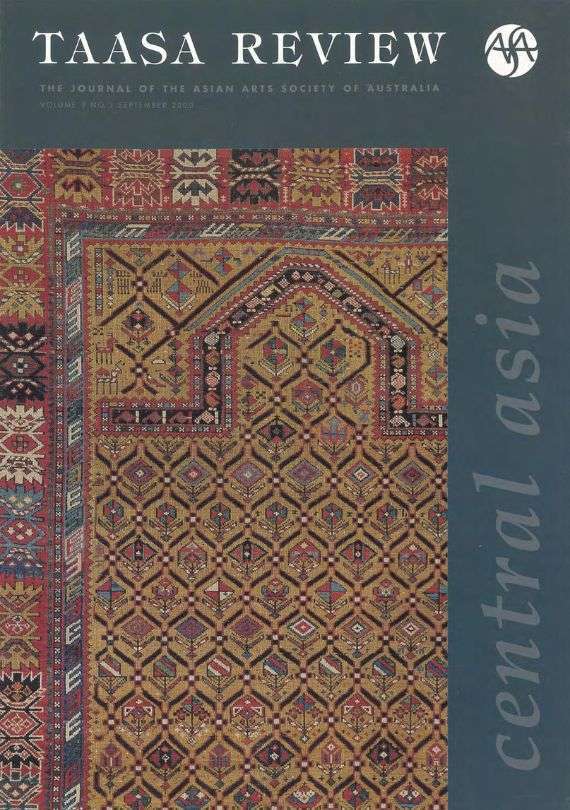TAASA Review Issues
September 2000
Vol: 9 Issue: 3
Central Asia
Editors: Ann MacArthur & Christina Sumner
Cover Photo
Marasali prayer rug eastern Caucasus, circa 1860, 145 x 120 cm
From the exhibition Looking into Paradise being held at Nomadic Rug Traders through September and October.
TAASA Members may log in to download a PDF copy of this issue as well as past TAASA Review issues back to 1992.

Editorial
Christina Sumner
This issue of TAASA Review is dedicated to Central Asia and the publication of papers given at the symposium Silken Steppes: textile arts of Central Asia, held at the Powerhouse Museum, Sydney on Sunday 29 August last year. The seminar was jointly organised by a five-person committee of representatives from TAASA, the Oriental Rug Society of NSW (ORS) and the Powerhouse Museum, with support and very welcome practical help from a number of others.
This collaboration by TAASA and the ORS brought together two of Sydney’s special interest societies in their shared passion for the textile arts of Asia. It also reflected the decision of TAASA’s Textile Focus Group committee, who initiated the symposium project, to treat the often separate worlds of Central Asian rugs and textiles as one. This conjunction is matter-of-course for some rug and textile lovers but problematic for others.
We wanted to reinforce in those who attended the symposium an understanding of the strikingly varied textile works of Central Asia – carpets, tent and animal trappings on the one hand, and ikats, suzanis and paranjas on the other – as products of the single collaborative system that is Central Asia itself. We wanted to turn diehard ‘ruggies’ on to the delicate charm of urban embroidery and textile lovers to the warmth and richness of Turkmen and Uzbek carpets. We wanted to bring ruggies and textile lovers together in their appreciation of the symbiotic relationship between traditional tent and town and the design relationship between carpets and ikats; in their awareness that Central Asian nomadic textile production is most fully understood when you know what was going on in the nearby oasis.
Five of the eight papers given at the symposium, by keynote speakers George O’Bannon and Sheila Paine and by Dee Court, Leigh Mackay and Christina Sumner, are included in this issue of TAASA Review. These range from the global topics of ‘Peoples of Central Asia’ m1d ‘Embroideries of oasis and steppe’ to close-focus articles on Uzbek rugs, ikats and paranjas. Sadly, the untimely death of Anne Baker in February this year has deprived us of a great researcher and communicator, and of the opportunity to revisit through publication her excellent lecture on gold embroidery. David Christian’s paper on the Silk Roads in world history, which opened the seminar, is not included either as it was published in full in the Spring 2000 issue of the Journal of World History. We are fortunate however in being able to add Professor Nicholas Sims-Williams’ ‘Gods and Merchants: Sogdian inscriptions of the Upper Indus’, which was presented as an Art Gallery of New South Wales lunchtime lecture in September 1998.
Interest in Central Asia, and in its rugs and textiles, has long been a passion for select members of the Australian community but has expanded greatly over the last few years. This is reflected academically in the appointment of Central Asian scholars to Australian universities, in the establishment of The Australasian Society for Inner Asian Studies and in the Australian-led excavations in Karakalpakstan. Interest in the textiles of Central Asia has also blossomed, as shown by the wealth of well-attended exhibitions and seminars last year. But we textile lovers can be a fickle lot; shifts of allegiance occur regularly in our love affair with cloth as we encounter in turn the exquisite textile arts of China, Japan, Indonesia, Laos, India, Turkey, Korea – and now Central Asia. Some of us will move happily on; others however will surely find themselves enslaved for life, entranced by the splendid carpets and textiles of Central Asia, by their colour and artistry, their elegance and history, the oases and steppes they come from, and the magnificent people who made them. Welcome!
Table of contents
3 EDITORIAL: CENTRAL ASIA – Christina Sumner
4 PEOPLES OF CENTRAL ASIA – Leigh Mackay
7 UZBEK RUGS – George O’Bannon
10 EMBROIDERIES OF OASIS AND STEPPE – Sheila Paine
14 GODS AND MERCHANTS: SOGDIAN INSCRIPTIONS OF THE UPPER INDUS – Nicholas Sims-Williams
18 SPLENDID SILKS: THE IKATS OF CENTRAL ASIA – Christina Sumner
20 PARANJA: A CASE STUDY – Dee Court
22 ARTS OF EARTH, SPIRIT AND FIRE – Claire Roberts
24 REVIEWS AND PREVIEWS
27 TAASA MEMBERS DIARY
BECOME A MEMBER
To download a PDF copy of this issue as well as past TAASA Review issues, receive discounted entry to industry events and participate in exclusive study groups, join the TAASA Community today.
TAASA Review Issues
2025
2024
2023
2022
2021
2020
2019
2018
2017
2016
2015
2014
2013
2012
2011
2010
2009
2008
2007
2006
2005
2004
2003
2002
2001
2000
1999
1998
1996
1995
1994
1993
1992
TAASA Review Issues
2025
2024
2023
2022
2021
2020
2019
2018
2017
2016
2015
2014
2013
2012
2011
2010
2009
2008
2007
2006
2005
2004
2003
2002
2001
2000
1999
1998
1996
1995
1994
1993
1992